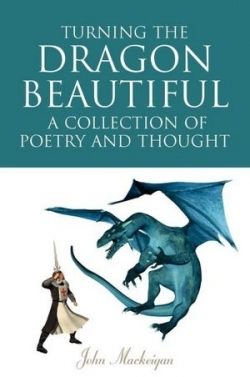Turning the Dragon Beautiful
A Collection of Poetry and Thought
In the heartfelt preface of Turning the Dragon Beautiful, John Mackeigan states that, “This collection of poems is dedicated for all those who have faced and will face the dragon that is depression.” Unfortunately, his collection, although well meaning, is often repetitive and does not always connect to its audience.
Through its four sections (“Dragon Tale,” “Where Joy Begins,” “Where Joy Reigns,” and “Under the Sun”), the book makes a positive arch—an emotional journey from deep depression to hopeful love. The book begins with poems about a narrator with a broken heart, a severed relationship with a daughter, a lacking community, and it ends with poems that feel uplifting.
Even though Mackeigan tries to speak from his heart, he often alienates his audience with confessional details such as private jokes between lovers and imagery that sometimes doesn’t leave room for the imagination. The book includes themes that are often more personal than universal, making them inaccessible to a larger audience.
Even so, the poems that draw from Mackeigan’s daily life are more effective than his science-fiction and fantasy-inspired pieces about dragons, angels, and wizards. At first glance, the book seems to be advertising a science-fiction novel, and the dragon imagery in the poems is often repetitive.
While the collection holds together as a thematic grouping, the individual poems lack structure. Little attention seems to have been paid to the crafting of the lines, which in some cases could have been shorter to accentuate line breaks. The language is often archaic, with predictable rhymes. In “Demon Ride: Dragon Returns,” the narrator describes the mother of his child and states: “Using the child as a pawn against me, she swore revenge, and past it could not see.” This couplet is an example of the lackluster language throughout the book.
Some of the stronger poems in the collection stress form and function and avoid the rhythm problems found elsewhere in the book. One example is the poem “The Dragon Lives,” which concludes: “Lend this creature to an untimely end, / Outcast forever all thoughts you may send: / Death to the dragon, its power no more, / Ending your conflict’s invasive war.” Because of its strong rhythm and effective second-person narration, these lines sound like an inspiring battle cry. Unfortunately, the rest of the poems in the collection lack this strength.
At his best, Mackeigan has the ability to reach into his daily experience and garner some deeper insight into his own life. It is through such moments that he is able to provide a voice full of hope for those who struggle with depression.
Reviewed by
Colby Cedar Smith
Disclosure: This article is not an endorsement, but a review. The publisher of this book provided free copies of the book and paid a small fee to have their book reviewed by a professional reviewer. Foreword Reviews and Clarion Reviews make no guarantee that the publisher will receive a positive review. Foreword Magazine, Inc. is disclosing this in accordance with the Federal Trade Commission’s 16 CFR, Part 255.

